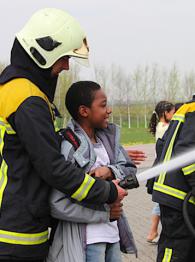
About the Project
This project is one of the 2010 WISE Awards finalists.
IMC Weekend School, founded in 1998, offers supplementary education for children aged 10 to 14 in underprivileged neighborhoods in the Netherlands. It is expanding globally (Brussels, Hong Kong). In a three-year course, volunteer experts introduce students to a wide range of topics, including medicine, law, computer studies, philosophy, astrology, and the arts. The curriculum also includes training in presentation, research, debate, and conflict resolution.
The goals of the program are to provide students with the skills, knowledge and audacity that are needed to find a place in society that matches their capacities. The 10 Dutch branches have 1,000 students. Around 2,000 volunteer guest teachers participate each year. Companies and foundations fund all branches.
Members of the alumni program – currently 1,350 – encourage each other to persevere, and help teach the younger generations. The school’s research unit collaborates with universities in studies of impact factors. Data shows that the IMC Weekend School enhances students’ future prospects, audacity to engage, feelings of connectedness to society, and perseverance. IMC Weekend School is innovative in that it provides real-life education. It connects youth to passionate professionals, who engage them in their worlds. The contacts created between different social classes affect both the students and the guest teachers.
Context and Issue
IMC Weekend School addresses student motivation and the sense of citizenship. All around the world, schools encourage students to obtain their diplomas, but school alone is not enough for students to find their place in society. Especially in underprivileged neighborhoods, a lack of knowledge about society and a lack of audacity to engage may hinder students in pursuing their motivation, and becoming responsible citizens.
Motivated, responsible citizens are of key value to both individual lives (health, well-being) and society at large. In all professions – from bus driver to manager to scientist – motivation and responsibility mark the difference between those who can and cannot positively contribute to society. Motivation and social responsibility are not automatically learned in regular schools and they require real-life education.
The Solution and Impact
IMC Weekend School’s philosophy is that education should nourish children’s’ natural curiosity, and their capacity for motivation and social responsibility. It does so by engaging them in real-life education. Through sustained collaboration with passionate professionals, students learn to understand their options in society, their preferences, the audacity to pursue their talents, and the value of contributing positively to society.
The project’s main strengths lie in the fact that:
- It is a sustained program, with a long-term impact on children’s’ development;
- It gains vast social support (2,000 volunteer guest teachers per year, over 250 corporate sponsors and in-kind partners);
- It inspires like-minded initiatives, and serves as an example in the social debate about education.
The project’s impacts are threefold:
1 – It enhances students’ future prospects, audacity to engage, feelings of connectedness to society, and perseverance in the regular school system;
2 – Weekend School alumni engage in educating the younger generations, and set up their own community projects;
3 – It has inspired over 30 independent copy-projects.
The total number of beneficiaries to date is 2,350. IMC Weekend School has 10 locations in the Netherlands, one in Brussels and one in Hong Kong. In addition, it has inspired over 30 independent copy-projects in the Netherlands.
Future Developments
IMC Weekend Schools’ objectives for the next five years are: (a) showcasing the project and its impact (through popular media, films and books); (b) explaining impact factors (in academic research reports and books); (c) bending the method back to regular education (assisting educators in setting up part-time Weekend School education in their schools); (d) (internationally), assisting and training social entrepreneurs to set up Weekend Schools in their communities.


